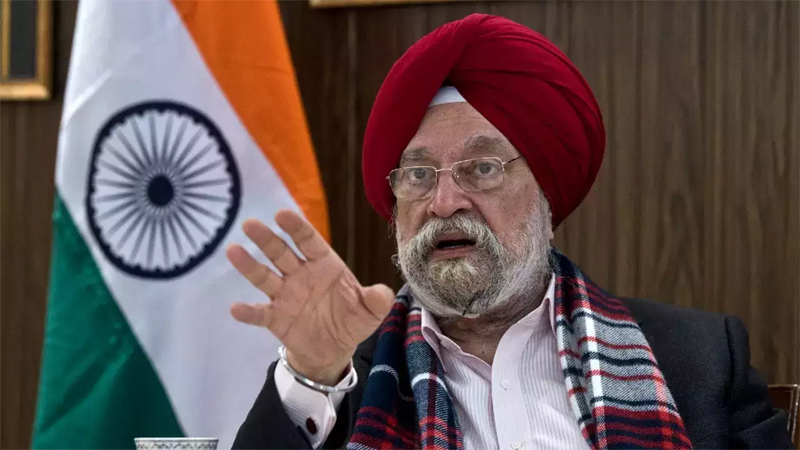New Delhi, Dec 16: On Monday, Union Minister Hardeep Singh Puri criticized former Congress-led administrations for their handling of Article 370, arguing that the party neglected its constitutional obligations in relation to Kashmir. He stated that what was originally intended as a “temporary” provision became effectively permanent due to Congress’s lack of “courage to act.”
While addressing the ‘Glorious Journey of 75 Years of the Constitution of India’ in Rajya Sabha, Puri, who serves as the Minister for Petroleum and Natural Gas, directed his criticism towards the Congress and referenced the plight of Kashmiri Pandits as well as the anti-Sikh riots.
Speaking about Article 370, Puri noted that Babasaheb Ambedkar did not oversee its drafting and mentioned that when the Constituent Assembly passed Article 370—then labeled 306A—Ambedkar chose not to voice his concerns. He also pointed out that Sardar Patel was taken aback by the concessions given to Sheikh Abdullah and his associates.
He emphasized that it took the “indomitable courage and resolve” of Prime Minister Narendra Modi to repeal this constitutional article, which had been rendered de facto permanent through appeasement politics, correcting a historical injustice in the process.
Puri attributed the inclusion of this special provision in the Constitution to Sheikh Abdullah’s autonomy demands being backed by his “dear friend,” Pandit Jawaharlal Nehru. He quoted Ambedkar’s warning to Abdullah about the long-term ramifications of granting special status to Kashmir, asserting it would isolate the region from India’s economic development and opportunities.
He further stated that the Congress party failed to uphold its constitutional duties regarding Kashmir, leading to what should have been a temporary provision becoming a permanent fixture for nearly 70 years due to a lack of decisive action.
Puri characterized Article 370 as “an anomaly, an aberration, a fracture in the Constitutional fabric of India,” arguing that it ran contrary to the essence of the nation.
He lamented that a region with deep historical significance in Bharat’s history became almost estranged from India after independence, and its residents, some of whom trace their lineage back to the Vedic era, were denied the same fundamental rights enjoyed by others across the country. He highlighted their lack of rights, education, and job opportunities.
“The brokers who claimed to represent Jammu and Kashmir fostered a culture of stone-pelting and corruption,” Puri asserted, noting that government initiatives went largely unimplemented in the erstwhile state.
He expressed concern over the genocide-like conditions faced by Kashmiri Pandits, many of whom were forced to flee, while those who remained fell victim to violence and murder.
“There has been considerable discussion on the Constitution serving as a ‘Suraksha Kawach.’ Were the Kashmiri Pandits not a minority? Where was this constitutional safeguard during their plight?” he questioned.
Criticizing the Congress for presenting itself as a defender of minority rights, Puri recalled the party’s historical actions, such as running sterilization camps for Muslim men in Delhi in 1976, and its involvement in communal riots that led to loss of life among innocent Muslims. He questioned whether such individuals lacked constitutional rights.
Puri also criticized the Congress for overturning the Supreme Court’s ruling in the Shah Bano case, claiming it was done to appease hardliners within the Muslim community. He argued that for the Congress, minority welfare was merely a façade for appeasement, while under the Modi administration, it is focused on inclusive development for all citizens.
He noted that minorities have greatly benefited from a variety of central government schemes.
“For those who insist that the Constitution acts as a ‘suraksha kawach’ for citizens, I pose the question: What was done when 3,000 innocent Sikhs were murdered on the streets of Delhi?” Puri concluded. (Agencies)


Leave a Reply